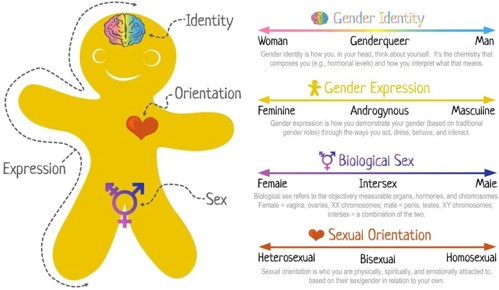The high court ruled 6-3 to uphold and defend a Tennessee law that bans puberty blockers and hormone therapy for minors who say they are transgender, meaning they claim to identify as the opposite sex.
The term “gender-affirming care” is the trans-friendly description for body-altering medical procedures, such as dispensing estrogen to young boys and performing a body-chopping surgery that removes the breasts of girls.
 Those procedures are known by critics as “gender-mutilation procedures.”
Those procedures are known by critics as “gender-mutilation procedures.”
The case before the high court was United States v Skrmetti, so named because the transgender-friendly Biden administration joined the plaintiffs to fight the Tennessee law.
The ruling not only affects Tennessee but 26 other U.S. states, too, that have passed similar measures.

Transgender activists and their allies claim the ruling harms minors, but legal expert and radio host Jenna Ellis says Tennessee has the right to protect children from what she calls child abuse.
"I think it's great that a ban on child abuse is constitutional," she tells AFN. "That's obvious and this was exactly the way that this case should have gone."
Reacting to the ruling in an X post, well-known trans detransitioner Chloe Cole celebrated the decision after years of criticizing transgender activists and the medical community.
"The highest court in the land ruled that there is, in fact, no such thing as a transgender child," Cole wrote. "I’m still in shock."

Cole, who detransitioned back to female as a teenager, has emerged as a vocal critic of the medical community for convincing mentally confused children to mutilate their bodies.
Cole, at the age of 15, had her breasts removed as part of female-to-male transition. She has blamed that surgery and hormone treatments for "irreversible changes" to her body.
Ruling defended 'common-sense law'
According to a Scotus Blog story, Chief Justice John Roberts delivered the majority opinion in a 24-page ruling. He rejected the claim the Tennessee law discriminates according to sex, writing that the law “prohibits health care providers from administering puberty blockers and hormones to minors for certain medical uses, regardless of a minor’s sex.”
 Reacting to the 6-3 ruling, Dr. Jared Ross of Do No Harm tells AFN the high court delivered a “massive win” that upheld a “common-sense” state law.
Reacting to the 6-3 ruling, Dr. Jared Ross of Do No Harm tells AFN the high court delivered a “massive win” that upheld a “common-sense” state law.
“This is ideologically-motivated butchery,” Ross, describing the controversial medical procedures, “under the thinly-veiled guise of health care.”
The Court's decision respects the sovereignty of states without bucking federal law, Matt Rice, the Tennessee solicitor general who argued the case, said in an appearance on Washington Watch Wednesday.
"The Constitution has an important but a very limited role. The states were the traditional regulators of medicine, and they exercise that role here. And without running afoul of any equal protection or other constitutional provision, that power remains with the states."
Everybody wins, Rice said.
"We think that's a good thing. We think that allowing states the ability to to adopt policies that match their constituents' views and viewpoints is good, not only for the state of Tennessee, but for the country."
Back in the Scotus blog story, it points out Justice Clarence Thomas joined Roberts’ opinion but also wrote his own 23-page concurring opinion. He criticized the so-called medical experts, who promote trans-related hormones and surgeries, writing that they “have surreptitiously compromised their medical recommendations to achieve political ends.”
 Thomas also praised his colleagues for a majority ruling that Thomas said is upholding the Tennessee law. That law, he wrote, gives the Tennessee citizens, their elected representatives, and the democratic process “the power to decide how best to address an area of medical uncertainty and extraordinary importance.”
Thomas also praised his colleagues for a majority ruling that Thomas said is upholding the Tennessee law. That law, he wrote, gives the Tennessee citizens, their elected representatives, and the democratic process “the power to decide how best to address an area of medical uncertainty and extraordinary importance.”
In a dissent joined by her liberal colleagues, Justice Sonia Sotomayor wrote that the majority “abandons transgender children and their families to political whims.”
Barrett raises ‘immutable’ issue
In a third majority opinion, Justice Amy Coney Barrett questioned the transgender movement itself for presenting itself as a Civil Rights-like movement, such as blacks fighting discrimination and demanding equality.
 “Transgender status is not ‘immutable,’ and as a result, persons can and do move into and out of the class,” she wrote. “Members of the class differ widely among themselves, and it is often difficult for others to determine whether a person is a member of the class.”
“Transgender status is not ‘immutable,’ and as a result, persons can and do move into and out of the class,” she wrote. “Members of the class differ widely among themselves, and it is often difficult for others to determine whether a person is a member of the class.”
Back in December of last year, when the justices heard oral arguments in Skrmetti, an AFN story described how Justice Samuel Alito (pictured at right) raised “immutable” issue with an ACLU attorney. The attorney, Chase Strangio, appears to be a man with a mustache and short hair but is, in reality, a woman.

In his exchange with Strangio, Alito cited the term “genderfluid” to point out some people born male later identify as female, and some people born female later identify as male.
“Are there not such people?” Alito asked.
“There are such people. I agree with that,” Strangio, who herself fits that definition, replied.
“So it’s not an immutable characteristic is it?” Alito summarized.







